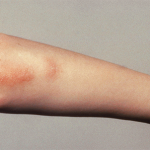Bonelli et al. specifically examined patients treated with rituximab who failed to seroconvert after initial COVID-19 vaccination, randomizing them to receive homologous or heterologous booster vaccines.5
“Ninety-four percent of patients who originally did not seroconvert did develop either humoral or cellular response after the booster shot, which is good news,” said Dr. Bonelli. There was no statistically significant difference between the use of homologous or heterologous boosters, but more patients who received an mRNA booster demonstrated humoral responses than patients who received a vector-based booster.
Humoral & Cellular Immune Responses to the Pfizer-BioNTech Vaccine
Satveer Mahil, PhD, MRCP, consultant dermatologist and senior lecturer, St John’s Institute of Dermatology, Guy’s and St Thomas’ National Health Service Foundation Trust and King’s College, London, shared data on the humoral and cellular immune responses to a second dose of the Pfizer-BioNTech vaccine in people receiving methotrexate or other targeted immunosuppression (e.g., inhibitors of tumor necrosis factor, interleukin [IL] 17 or IL-23).6
To date, we have limited data on COVID-19 vaccine immunogenicity in patients receiving therapeutic immunosuppression because this group was excluded from the COVID-19 vaccine trials. Mahil et al. aimed to better understand vaccine responses in these patients. They used immunogenicity assays to examine humoral immunity (seroconversion and functional capacity of plasma to neutralize wild-type SARS-CoV-2, alpha and delta variants) and cellular immune responses.
Seroconversion rates after the first dose were lower in patients receiving immunosuppressants than in healthy controls. But all patients seroconverted after the second vaccine dose, with similar anti-spike IgG titers to controls. Neutralization activity was also similar between groups for both the alpha and delta variants.
However, T cell response rates differed between groups after the second dose. One hundred percent of healthy controls mounted a T cell response compared with only 71% of immunocompromised patients (P=0.02). Of note, medication doses were not held before or after vaccination during this study, which may have affected the results.
Dr. Mahil said, “The durability of antibody responses in the context of absent T-cell responses is uncertain and warrants further study. Larger and longer-term cohort studies analyzing immunogenicity of further vaccine doses are vital. Real-world clinical effectiveness data will also be critical to interpreting lab assays [because] we don’t know what the clinical thresholds are to interpreting the humoral or cellular responses yet.”
Secukinumab in GCA
Jens Thiel, MD, professor, Division of Rheumatology and Immunology, Medical University of Graz, Graz, Austria, and Clinic for Rheumatology, University Hospital Freiburg, Germany, shared data from TitAIN, a phase 2 randomized controlled trial investigating the efficacy, safety and tolerability of secukinumab in 52 patients with giant cell arteritis (GCA). Biologic naive patients aged 50 years or older with new-onset or relapsing GCA were included in the study. The majority of patients were white and women, with an average age of 73.1 years. 7

